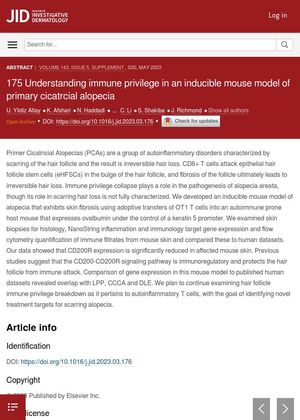Understanding Immune Privilege in an Inducible Mouse Model of Primary Cicatricial Alopecia
primary cicatricial alopecia PCA scarring alopecia CD8+ T cells epithelial hair follicle stem cells eHFSCs adoptive transfers OT1 T cells autoimmune-prone mice ovalbumin keratin 5 promoter skin fibrosis CD200R immunoregulatory hair follicles gene expression lichen planopilaris LPP central centrifugal cicatricial alopecia CCCA discoid lupus erythematosus DLE hair follicle stem cells autoimmune mice skin scarring immune regulation hair follicle protection gene similarities

TLDR The study found that a key immune pathway protecting hair follicles is reduced in a mouse model of scarring hair loss.
This study investigates the role of immune privilege in primary cicatricial alopecia (PCA) using an inducible mouse model. PCA is characterized by scarring and irreversible hair loss due to CD8+ T cells attacking epithelial hair follicle stem cells (eHFSCs). Researchers used adoptive transfers of OT1 T cells into autoimmune-prone mice expressing ovalbumin under a keratin 5 promoter to induce skin fibrosis. Analysis of skin biopsies revealed significantly reduced CD200R expression in affected mouse skin, a pathway known for its immunoregulatory role in protecting hair follicles. The gene expression in this mouse model showed similarities with human conditions like LPP, CCCA, and DLE. The study aims to further explore hair follicle immune privilege breakdown to identify new treatment targets for scarring alopecia.


